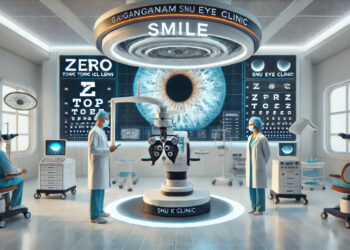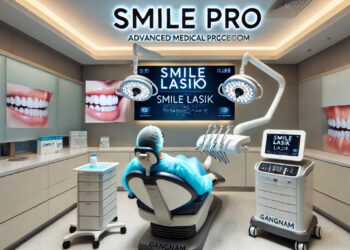For many people struggling with nearsightedness, farsightedness, or astigmatism, glasses and contact lenses are no longer the only options to achieve clear vision. Advanced ophthalmology has created new solutions that provide life-changing results with long-term safety and precision. In Seoul, SNU Eye Clinic has become internationally recognized for pioneering techniques in lens implantation surgery, offering patients from all over the world a new opportunity to see naturally without depending on external lenses.
Lens implantation surgery at SNU Eye Clinic focuses on customization, advanced technology, and patient-tailored outcomes. By combining 3D imaging with innovative ICL (Implantable Collamer Lens) technology, the clinic provides a safe, effective, and personalized vision correction process. These techniques allow even patients with high prescriptions, thin corneas, or other complications that limit LASIK or 라식 eligibility to experience freedom from glasses or contact lenses.
The rise of lens implantation as an alternative to LASIK
LASIK has been the gold standard of refractive surgery for decades, but not everyone is a candidate for laser-based procedures. People with extreme myopia, irregular corneas, or dry eyes may face limitations in LASIK suitability. This is where lens implantation surgery offers an alternative. Instead of reshaping the cornea with a laser, an ICL is carefully inserted inside the eye, between the iris and the natural lens. The procedure corrects vision by adding a precisely designed artificial lens that works with the patient’s natural optics.
Unlike traditional cataract surgery, the natural lens remains intact during ICL implantation. This preserves accommodation ability while still correcting refractive errors. For patients under 40, this means a seamless continuation of natural near and intermediate vision while enjoying clear distance sight.
Advanced 3D imaging for safety and precision
One of the major challenges in lens implantation surgery is ensuring accurate sizing and positioning of the implant. At SNU Eye Clinic, 3D imaging plays a central role in pre-surgical planning. High-resolution imaging technologies allow surgeons to map the internal eye structures in detail, measuring corneal curvature, anterior chamber depth, and other key dimensions.
This data is processed with advanced software that tailors the lens to the individual patient’s anatomy. With this level of precision, the risk of lens misplacement or complications is minimized. The clinic’s track record shows less than 1% lens turnover, which highlights the exceptional safety and long-term reliability of their approach.
Patients often express concern about possible complications with implants, such as rotation or sizing issues. The use of 3D imaging significantly reduces these risks by ensuring every lens is perfectly fitted before surgery. This not only improves outcomes but also boosts patient confidence in undergoing the procedure.
Why ICL technology is revolutionizing refractive surgery
Implantable Collamer Lenses have gained global attention due to their safety and biocompatibility. Made from a collagen-based material, the ICL naturally integrates with the eye’s internal environment. It does not cause irritation or rejection, which makes it ideal for long-term vision correction. Unlike contact lenses, it requires no daily maintenance.
Another significant advantage of ICL surgery is its reversibility. If necessary, the lens can be removed or replaced in the future without damaging the eye. This flexibility offers peace of mind, particularly for younger patients who may experience changes in vision over time.
ICL lenses also provide superior quality of vision compared to glasses or contact lenses. Many patients report sharper contrast, brighter colors, and clearer night vision after implantation. This makes it a particularly attractive option for people with demanding visual needs, such as athletes, professionals, or individuals sensitive to optical imperfections.
Addressing high myopia and complex prescriptions
Many patients who come to SNU Eye Clinic are seeking solutions after being told they are not candidates for LASIK due to extremely high myopia or other conditions. In these cases, lens implantation often provides the answer. Unlike corneal refractive surgery, which is limited by tissue thickness, ICL implantation can correct prescriptions far beyond the range of LASIK.
Patients with astigmatism can also benefit from Toric ICL technology, which corrects cylindrical errors with remarkable accuracy. The Zero Toric ICL used at SNU Eye Clinic ensures precise alignment, supported by advanced surgical techniques and robotic guidance when necessary. This allows for stable long-term correction without the need for further adjustments.
Customized care at SNU Eye Clinic
What sets SNU Eye Clinic apart is its dedication to tailoring every procedure to the individual patient. The team evaluates not only refractive error but also lifestyle, occupational needs, and ocular health before recommending lens implantation. This ensures that the chosen solution aligns with both medical safety and personal visual goals.
Led by Dr. Chung Eui-sang, a pioneer in refractive surgery with decades of experience, the clinic has treated thousands of patients, including over 1,200 international visitors between 2022 and 2023. Patients travel from around the world to Seoul to benefit from the clinic’s ZEISS-certified technology, advanced imaging systems, and personalized approach.
Long-term outcomes and patient satisfaction
The success of lens implantation at SNU Eye Clinic is reflected not only in the technology used but also in the satisfaction reported by patients. Many experience immediate improvements in vision, with stable and lasting results. Unlike contact lenses that require ongoing maintenance or glasses that may become inconvenient, ICL surgery provides a permanent yet adaptable solution.
Long-term follow-ups at the clinic demonstrate that complications are rare and manageable. With careful pre-surgical evaluation, accurate 3D planning, and precise surgical techniques, patients enjoy freedom from corrective eyewear without compromising safety.
Conclusion
Lens implantation with 3D imaging and ICL technology is transforming the future of vision correction, especially for patients who are not candidates for traditional LASIK procedures. At SNU Eye Clinic in Seoul, this surgery is performed with global standards of safety, customization, and innovation, delivering long-lasting results that restore natural vision.
By combining pioneering expertise with cutting-edge technology, the clinic has become a trusted destination for patients worldwide seeking life-changing visual freedom. For more information, you can visit snuseoul.com to explore the full range of advanced eye care services offered.



